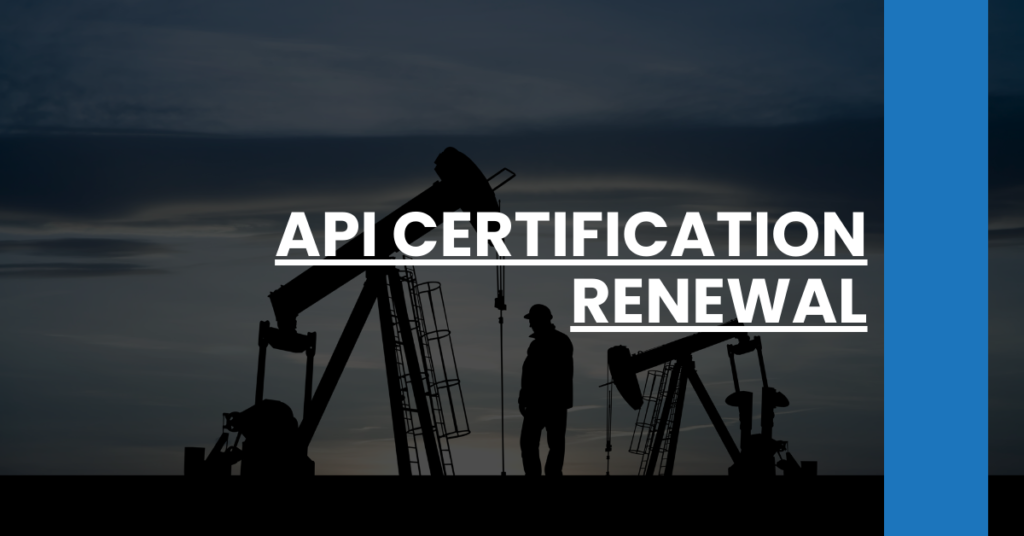API Certification Renewal is crucial for maintaining your professional credibility in the petroleum industry.
- Stay Up-to-Date: Ensuring your knowledge and skills meet the latest industry standards
- Compliance: Adhering to safety and operational protocols to sustain high-performance levels
- Professional Advancement: Leveraging renewed credentials for career growth and opportunities
Seamless API Certification Renewal supports your ongoing professional development.
Conclusion: The Importance of Staying API Certified
Ensuring your API certification is up-to-date is not just a matter of compliance — it’s a commitment to excellence within the industry. With rapidly evolving technology and ever-changing industry standards, maintaining your API certification through timely renewal is key to both your personal growth and professional credibility.
Sustain Your Industry Relevance
API certification marks you as a specialist who is abreast of the latest trends and practices in your field. Renewing your certification isn’t just a bureaucratic formality; it’s a declaration that you’re serious about your profession and dedicated to maintaining a high standard of knowledge and competency.
Enhance Your Professional Image
With an active API certification, you’re better positioned in the job market. Employers recognize the value of a certified professional who shows dedication to continuous improvement. Plus, this commitment often translates into better job prospects and the potential for higher earnings.
Keep Safety and Quality in Focus
An updated API certification renewal status isn’t just about your reputation — it’s about the safety and quality that you bring to the workspace. Your renewed credentials mean you’re conversant with current regulations and best practices, reducing the risk of costly errors or accidents.
Continuous Learning and Growth
API certification renewal encourages ongoing education and professional development. By participating in continuing education programs, you participate in lifelong learning that can broaden your expertise and open doors to new opportunities.
Networking Opportunities
The process of accumulating professional development hours needed for certification renewal often involves attending seminars and workshops. These settings provide excellent opportunities to connect with peers and experts, cultivating relationships that can enrich your professional network.
As you move forward with your API certification renewal, remember that this process is not merely a periodic task, it’s a stepping stone toward a more knowledgeable, connected, and recognized professional you. Let your renewed certification be the beacon that highlights your expertise, professionalism, and commitment to quality in the oil and natural gas industry.
Conclusion: The Importance of Staying API Certified
Maintaining your API Certification is crucial—it signifies your dedication to professional excellence and compliance with industry standards. As you navigate the renewal process, remember that it’s about more than keeping your credentials current. It is a testament to your commitment to safety, quality, and ongoing professional development within the petroleum industry.
Your Professional Edge
Earning your API Certification was a significant achievement, but actively renewing it is what truly sets you apart in the industry. With this certification, you demonstrate:
- Advanced expertise: Showcase a deep understanding of industry requirements and standards.
- Commitment to safety: Highlight your dedication to maintaining the highest safety protocols.
- Professional dedication: Exhibit a strong commitment to your career and the petroleum sector.
Benefits of Ongoing Certification
Your API Certification isn’t just a badge of honor—it’s a tool that propels your career forward. Maintaining your certification ensures that you:
- Stay relevant: Your knowledge remains up-to-date with the latest developments and best practices.
- Enhance marketability: Stand out to potential employers who value up-to-date certifications.
- Ensure compliance: Meet regulatory requirements and contribute to the integrity of your operations.
- Foster professional growth: Renewal requires continuing education, which leads to new skills and expertise.
The Continuous Learning Cycle
API Certification renewal is an ongoing process that reinforces your commitment to professional growth. By engaging in required continued education, you are investing in a cycle of learning that benefits your career trajectory. Here’s how it works:
- Identify learning opportunities: Find courses and training that align with your professional goals and comply with API standards.
- Complete and document your education: Stay vigilant in recording your completed hours and maintaining necessary documents.
- Submit your renewal application: Approach this step with confidence, knowing you’ve fulfilled the prerequisites.
- Receive your renewed certification: Take pride in this accomplishment and its representations of your industry prowess.
The Power of Connection
Renewing your API Certification also means joining a network of committed professionals who value safety, quality, and efficiency. By attending relevant events and engaging in discussions, you’ll open doors to:
- Networking opportunities: Connect with industry leaders and peers who can influence your career path.
- Community engagement: Discuss challenges and share solutions that contribute to industry-wide improvements.
- Advocacy for standards: Be part of crucial conversations that help shape the future of your profession.
Staying the Course
Lastly, make the renewal process a part of your professional routine. Be proactive and methodical in managing your certification’s lifecycle—and it will reward you with credibility, opportunities, and a career that you can be proud of.
As you stride forward on your career path, remember that each API Certification Renewal cycle is an affirmation of your expertise. It’s an investment in your future that resonates with commitment, competence, and a clear vision for your role within the dynamic world of the petroleum industry.

